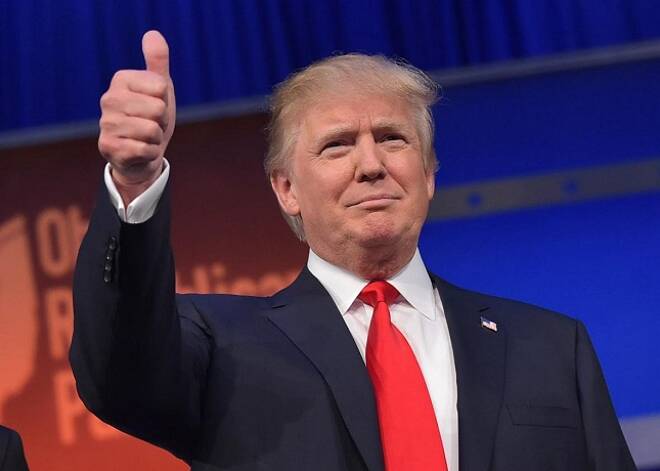Advertisement
Advertisement
2016 – The Most Influential People of the Year
By:
Who will we remember from this year, adding the much loved volatility to the markets, providing the investor an opportunity to flourish or in some cases…?
Who will we remember from this year, adding the much loved volatility to the markets, providing the investor an opportunity to flourish or in some cases…?
Donald Trump would have to be ranked up there as number 1, with Janet Yellen as number two, though Trump may be a little miffed if he was to see Yellen as his number 2.
It would be hard to give first prize to anyone else for the simple fact that, since Friday 4th November to yesterday’s close:
- The Dollar Spot Index has rallied 6.06%.
- Gold has slumped 13.3%.
- The Dollar – Yen has moved from ¥112 to ¥117.55, logging in a 13.99% gain indicative of just how risk friendly the president-elect actually is and perhaps most spectacularly
- Dow has moved from 17,888.28 to 19,942.09. While in percentage terms the 11.5% gain is not as impressive as the moves in gold and the Yen, the fact that what had already been considered an over-priced major has managed to move over 1,000 points in less than 7 weeks in itself is almost fantastic.
The FED Chair certainly deserves some of the credit, having sat at the helm of the FED manovering the U.S economy through the global financial crisis to something resembling a mature economy today.
The best of the rest would have to include:
Vladimir Putin: A helping hand in Trump’s victory is a hot topic warranting debate, putting Putin in at number 3, though he has also had great influence in the global political arena throughout the year, indirectly impacting the financial markets, with tension between Turkey and with the Democrats, not to mention it’s desires to get a stronger foothold within the Middle East. Putin has been playing more of a global game and with Trump now waiting for the 20th January inauguration, the game may be complete, the Russian Ruble having rallied 15.6%, year-to-date.
One thing is certain, should the Democrats get back into the oval office in 4-years’ time, there will be a legacy issue to contend with and it won’t be easy.
Haruhiko Kuroda: The Governor of the Bank of Japan kicked off the year with a bang, dropping rates into negative territory for the first time in history at the end of January, only for the Yen to rally 3.5% in the days after the decision, the BoJ Governor forgetting one cardinal rule, BoJ monetary policy and currency intervention has limited impact on appetite for the Yen in periods of market stress and a FED shifting to a more dovish outlook.
He had to face parliament and justify the decision and to this day, the BoJ remains under scrutiny on whether it is able to achieve its sole mandate of 2% inflation target.
David Cameron: Britain largely has David Cameron to thank for Brexit, with even the Brexit camp ill-prepared for the shock outcome, which was as much down to the lack of the government’s ability, than the Brexit camp’s abilities.
The Prime Minister resigned sobbing on his way out, cable slumping from a pre-referendum $1.4877 to a post referendum low of $1.2123 and let’s not forget that flash crash in October, which sent cable down 9% to $1.14 in less than a minute, leaving all of us refreshing charts in disbelief.
Mark Carney: The BoE Governor certainly justifies inclusion in the top 10, his calm yet assertive speech upon the result of the EU referendum easing any immediate market panic, the FTSE100 rebounding from an post referendum low of 5,982.2, to well above pre-referendum levels in a matter of days, the market’s buying into the Governor’s assurances and with just cause.
The Brexit panic had wiped a whopping $2.08tn off global shares in the aftermath of the referendum result.
Khalid Al-Falih: We would normally like to accredit the agreement by OPEC members to cut production to the Secretary General, but the final agreement must be attributed to the Saudis and their willingness to swallow their pride in the interest of restoring price stability. WTI had hit an intraday low of $26.02 in February. There were doubts that the Saudis would be able to put aside their difference with the Iranians, following the failed April agreement, but in the end they did and WTI currently sits at $52.5, with OPEC agreeing to cut production for the first time in 8-years.
With elections in key member states within the EU in 2017 to consider, a possible European banking crisis and perhaps an Asian debt crisis, 2016 may seem like a walk in the park. Some of those involved in yesterday have survived, others will be thanking their lucky stars that they are out of the game.
About the Author
Bob Masonauthor
With over 28 years of experience in the financial industry, Bob has worked with various global rating agencies and multinational banks. Currently he is covering currencies, commodities, alternative asset classes and global equities, focusing mostly on European and Asian markets.
Advertisement
